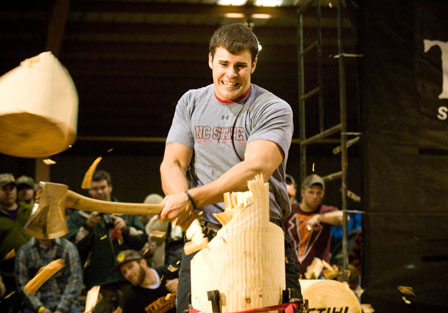NEWS RELEASE
Contact: Caroline Barnhill | NC State University News Services | 919.515.6251
 Getting children involved in finding ways to become more physically active can not only make them more aware of local recreational opportunities, but can even help increase their own physical activity. That’s the result of a study examining the role of seven national parks in contributing to the health of today’s youth. The study was conducted by researchers from a variety of disciplines at North Carolina State University and other U.S. universities and funded by the National Park Service.
Getting children involved in finding ways to become more physically active can not only make them more aware of local recreational opportunities, but can even help increase their own physical activity. That’s the result of a study examining the role of seven national parks in contributing to the health of today’s youth. The study was conducted by researchers from a variety of disciplines at North Carolina State University and other U.S. universities and funded by the National Park Service.
The researchers developed pilot programs aimed at increasing the awareness of health benefits from participating in recreational activities at national parks and increasing physical activity by park visitors.
Dr. Myron Floyd, professor of parks, recreation and tourism management at NC State, specifically examined the use of Cuyahoga Valley National Park in Ohio by studying area middle-school students.
“We decided early on that engaging the community in activities the park had to offer would be crucial in developing this pilot program,” Floyd said. “We had local 6th and 7th graders actually create the tagline to promote the program: Get Up, Get Out and Go!. The students also helped us determine what types of activities would get them interested enough to head out to the park.”
Local middle students students participated in an activity with a ranger in Cuyahoga Valley National Park. The program comprised a series of events at Cuyahoga Valley National Park that began with a kickoff event, featured weekly activities such as scavenger hunts and fishing lessons, and concluded with a festival. Advertisements of the program and its events – designed by the students themselves – were placed in local papers, on bus boards and at health fairs.
Floyd’s team compared awareness levels before and after the program and found out that the Get Up, Get Out and Go! worked. The study showed a significant increase in the level of awareness of Cuyahoga Valley National Park and its different offerings – 31 percent before the program was implemented versus 65 percent after the program – among the targeted youth population, with a reported increase in the percentage of participants who intended to visit a national park in the future – 18 percent before the program versus 51 percent after the program. Researchers also reported evidence of an increase in physical activity that was associated with the program’s activities.
“This study was important because it showed that engaging kids early on in the program planning process was important. A lot of the ideas we had for park activities, we quickly found out were not of interest to the children,” Floyd said. “It is imperative that we engage children in finding solutions that get them to be more physically active – whatever environment that may be in.”
The research was published in the Journal of Physical Activity and Health.
The Department of Parks, Recreation and Tourism Management is part of the university’s College of Natural Resources.
Learn more about PRTM research in the areas of livable communities and healthy living, human dimensions of built and natural environments, and sustainable tourism and economic development.
 Logan Scarborough recently won the STIHL TIMBERSPORTS Southern Collegiate Challenge, a regional competition. He will now compete in the national competition In Oregon in late August.
Logan Scarborough recently won the STIHL TIMBERSPORTS Southern Collegiate Challenge, a regional competition. He will now compete in the national competition In Oregon in late August. 

 The NC State Chapter of the International Society of Tropical Foresters (ISTF) is happy to announce that on April 16, 2010, it will be hosting the 3rd Annual Spring Symposium; “REDD After Copenhagen: Emerging Practices and Policies”.
The NC State Chapter of the International Society of Tropical Foresters (ISTF) is happy to announce that on April 16, 2010, it will be hosting the 3rd Annual Spring Symposium; “REDD After Copenhagen: Emerging Practices and Policies”. Getting children involved in finding ways to become more physically active can not only make them more aware of local recreational opportunities, but can even help increase their own physical activity. That’s the result of a study examining the role of seven national parks in contributing to the health of today’s youth. The study was conducted by researchers from a variety of disciplines at North Carolina State University and other U.S. universities and funded by the National Park Service.
Getting children involved in finding ways to become more physically active can not only make them more aware of local recreational opportunities, but can even help increase their own physical activity. That’s the result of a study examining the role of seven national parks in contributing to the health of today’s youth. The study was conducted by researchers from a variety of disciplines at North Carolina State University and other U.S. universities and funded by the National Park Service. NEWS RELEASE
NEWS RELEASE Dr. Michelle Gacio Harrolle and Dr. Samantha Rozier-Rich of the Department of
Dr. Michelle Gacio Harrolle and Dr. Samantha Rozier-Rich of the Department of